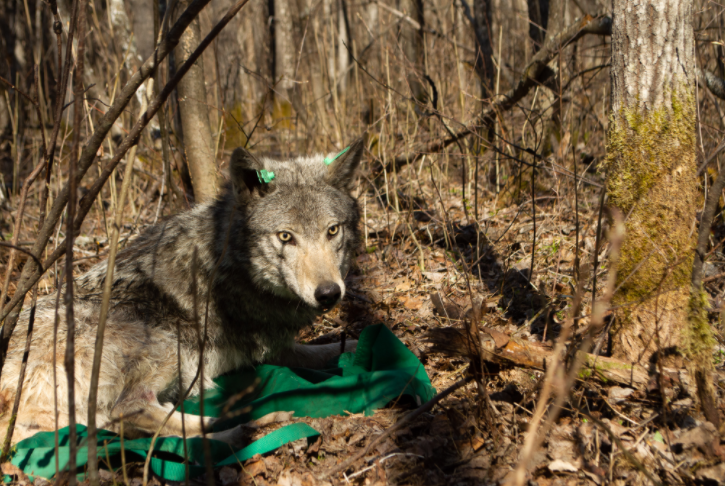THUNDER BAY — A wolf collared by researchers in Minnesota's Voyageurs National Park last spring is living a solitary life in Ontario, but is apparently doing well despite having travelled as far as Lake Nipigon.
Scientists working with the Voyageurs Wolf Project have dubbed her VO91.
Last May, they fitted the 3-to-4-year old wolf with a GPS tracker, and set her free again just south of Rainy Lake.
Almost immediately, she made a beeline for the border, then found her way to the northern part of Quetico Park.
Project lead Thomas Gable says the tracking device shows she spent a good part of the summer about 100 kilometres west of Thunder Bay.
"I'm guessing there was some sort of food source for her there, maybe a dump, that she kept returning to," Gable told Tbnewswatch.
Then, by late August, "she decided it was time to get up and go, and she travelled to basically the south end of Lake Nipigon."
Very quickly, however, VO91 turned around and made the long trek back to the area she had just come from, between Shabaqua and Raith.
In the process, she traversed the eastern shoreline of Dog Lake and the western shoreline of Black Sturgeon Lake.
"That's a substantial jaunt to do that. This morning she is still there" north of Shabaqua, Gable said in an interview Monday.
He said the wolf was in excellent condition when she was collared, with substantial fat reserves around her hips and rump, a good indicator of health.
"She's a lone wolf. Who knows where she came from, and who knows where she'll ultimately end up," Gable said.
It's not unknown for wolves to travel great distances.
In fact, two years ago the Voyageurs Wolf Project tracked a pair of animals that had moved separately from the US side of the border to north of Red Lake, where by coincidence they met and interacted with each other.
"They have the ability to travel unreal distances pretty quickly," Gable said.
Wolves wander in search of food, territory, and a mate, but he said biologists are still trying to work out why they sometimes have to travel so far.
"Surely, for example, between Voyageurs Park and Thunder Bay there's got to be multiple places that new packs could set up...That's something we'll probably never be able to fully understand."
Many wolves in the park have established packs within seven or eight kilometres of where they were born.
VO91's collar should keep transmitting for another two years. It has a remote drop-off device, as do all the other units in use, that will cause it to detach from the animal before the battery's power runs out, so it can be recovered.
Gable said his team will be watching to see if VO91 establishes a new territory, but is a bit concerned about the prospects for her long-term survival.
That's because lone wolves are generally at a higher risk of mortality "either from people or other wolves," he said, since they are often travelling over terrain they are not familiar with.
As a result, "they are at a higher risk of being harvested through a hunting season, getting hit by a car, or being killed by other wolves."
The project is currently following 20 collared wolves.
Gable said "when we collar them in Voyageurs, we want to see where they go, and where they eventually settle. Because that gives us a really good idea of how wolf populations in Minnesota and Ontario interact. Because that international border means nothing to them. It's really cool to know that we have wolves here going toward Thunder Bay or up to Red Lake."
Last year, the study team used a remote camera to record video of a female rescuing her pups from a flooding den.
The project is a collaboration between the University of Minnesota and Voyageurs National Park, with substantial funding provided by the Minnesota Environment and Natural Resources Trust Fund.
Author's note: This story has been updated to clarify that the collars are programmed to detach from the animals before the batteries die.
